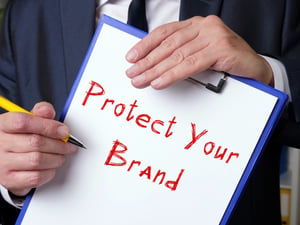It’s a scenario no business owner wants to imagine.
You’ve discovered that a mistake at the manufacturing plant has produced several wood pallets full of faulty products. While these products may not be dangerous, they will not work as intended. You must dispose of them so that they don’t make it to store shelves and ensure that you retain your excellent reputation.
You instruct an employee to dispose of the products, which are promptly placed in the trash receptacle behind your company’s warehouse. Your employee reports back to you in a few days that the product has been disposed of since they are no longer in the receptacle bin. A few weeks later, another employee comes to and says they just saw someone on eBay selling the exact same products.
Unfortunately, employee theft or people looking to make a quick buck, is a major reason why company products end up on the grey market where they will be sold for a fraction of the cost. Yet unaware consumers will think they’re getting the real deal. Consumers will suffer. Your brand will suffer.
Is there anything that could have prevented this scenario from unfolding? Yes … certified product destruction.
What is certified product destruction?
Certified product destruction, or certified product disposal, is a process by which products are destroyed or disposed of to ensure that they will not be resold or utilized illegally.
process by which products are destroyed or disposed of to ensure that they will not be resold or utilized illegally.
The best certified product destruction companies will provide authentication so that you have peace of mind and proof that your products are being disposed of properly.
But, is certified destruction right for your company? Below we’ll answer some frequently asked questions about this safeguard against the grey market and the protections this vital service offers.
What Is The Grey Market?
The grey market refers to the sale or trade of a commodity through channels that are not permitted by the original proprietor or the original manufacturer.
channels that are not permitted by the original proprietor or the original manufacturer.
The grey market tends to give people great deals on branded products. A lot of times people believe they’re getting an authentic product from a brand name. In reality, they get damaged, blemished or expired products that can tarnish a brand’s image.
They may even purchase counterfeit products that have been placed in authentic packaging that unscrupulous characters swiped from a trash receptacle or paid an employee to smuggle it out.
All of this is done in an effort by the grey market seller to make the product look legitimate.
How Do Products Ends Up On The Grey Market?
This is a tough question, since your products or product packaging can end up on the market a number of different ways. In fact, you may never know how your products ended up on the grey market.
Typically, employee theft or bribery, unlicensed disposal companies, unscruplious employees of disposal companies are the main case of why products end up on the grey market.
Once your products hit the grey market, there’s little you can do. The key is to put processes in place to prevent them from hitting the grey market in the first place, and that includes certified product destruction.
What Products Should You Consider For Certified Product Destruction?
There are several items you should consider for certified product destruction, including:
destruction, including:
- Uniforms with brand identification
- Damaged goods
- Discontinued products
- Manufacturing overruns
- Obsolete inventory
- Blemished or off-spec items
- Promotional merchandise
- Seized counterfeit products
- Unused or outdated product packaging
Any branded item you have, even if it never makes it to market, should be properly disposed of so that potential culprits don’t see an opportunity dropped at their feet.
It’s also important to remember that if your company handles other companies’ products, you may require the use of a certified product destruction service as well. For example, packaging companies are often responsible for ensuring a faulty item has been destroyed due to a misprint, wrong formula or some kind of other mistake that makes the product no longer viable.
If you’re tasked with the responsibility of packaging these products that now cannot go to market, you may be the one responsible for ensuring they get disposed of correctly. You also may need to discard excess packaging supplies that are branded.
Not only is the manufacturer’s reputation on the line, but so is your business to ensure that any faulty products are disposed of legally.The last problem you need is a law suit stemming from improper disposal.
What Happens If I Don’t Use Certified Product Destruction?
You could be liable for any defective or expired products if they’re not properly destroyed, even if your company did not purposely make it available for purchase.
not properly destroyed, even if your company did not purposely make it available for purchase.
You may also be setting your company up for data leaks to occur. In many states, including California, you must properly dispose of electronics because of their hazardous waste elements. However, it’s important to consider that both digital and paper documents should undergo thorough destruction to prevent disclosure of proprietary information or personnel data.
Product returns due to a recall are another common occurrence in the United States. If you are subject to a product recall due to risk of injury or illness, you should ensure that these products are properly disposed of through a certified and verified process.
If your company does not ensure that this happens, governing bodies like the U.S. Consumer Product Safety Commission may levy fines against you and your could suffer as well if consumers discover you did not properly dispose of dangerous products.
In some cases, court orders may require that a company executes destruction of their products. This often involves patent and copyright infringement cases and imported goods that are seized at the port of entry. If you do not comply with court orders, you may be held in contempt.
What Happens During Certified Product Destruction?
Certified product disposal companies ensure that all packaging and products destined for destruction are destroyed. They provide you with authentication that gives you the confidence that the packaging or product isn’t ending up in the wrong hands.
A certified disposal company has a strict chain of custody and a plan for disposal of packaging or rejected products that you transfer to their possession. They'll present you with:
- A written plan
- Photographic or video evidence
- Paperwork and permits
Certified product disposal companies should also have 24/7 surveillance in their disposal yards so that any perpetrators found near the products can be dealt with before they can interfere with the items destined for disposal.
What Should I Look For In A Certified Product Destruction Company?
If your company requires partnering with a certified product destruction company, finding the right one can require a little investigation on your part.
When looking for a product disposal company, make sure the business:
- Is certified, licensed and bonded
- Offers a detailed and transparent plan
- Provides evidence of destruction
- Offers assistance with manifest forms required for disposal
- Gives you a Certificate of Destruction form
- Is experienced in disposing the type of product or packaging that your company produces
If you are unsure whether your company requires the services of a certified product destruction company, the best ones will offer a walk-through program to help you identify areas of concern. It’s always better to be safe than sorry and protect your brand when it comes to the grey market and your company’s future.


Comment